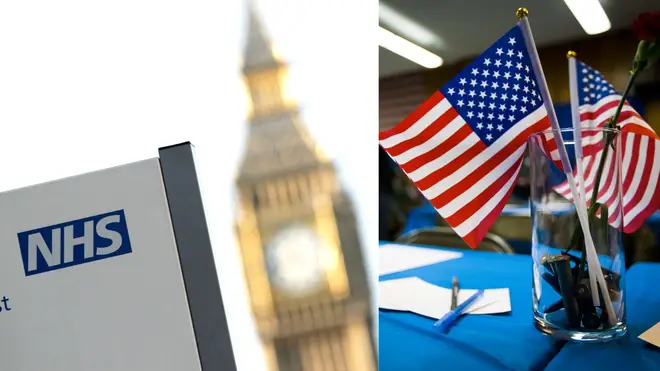
Ian Payne 4am - 7am
2 March 2020, 05:28

Boris Johnson had vowed to "drive a hard bargain" as the UK set out its objective for upcoming trade talks with the United States while keeping the NHS off the table.
The Prime Minister's words come as Britain prepares to send negotiators to Brussels to kick-start the nine-month process of vying to secure a new trade arrangement with the EU.
Both sides published their negotiation mandates last week, revealing that they are at odds over Boris Johnson's push for a comprehensive Canada-style free trade deal, as well as demands overfishing, state subsidies and standards.
Opening up opportunities for British companies and investors while ensuring the NHS is not for sale will be key objectives of the Government's negotiating platform.
The Government said it remains committed to keeping the NHS universal and free at the point of use, something which the Prime Minister was pushed on time after time during the general election.
A spokesperson said they would work to "rigorously protect the UK’s freedom to provide public services, such as the National Health Service, in the national interest. The NHS is not for sale and the Government is committed to the guiding principles of the NHS – that it is universal and free at the point of use."
The British team also wants to guarantee high standards and protections for British consumers and workers, including on animal welfare.
The Prime Minister said: "We have the best negotiators in the business and of course, we're going to drive a hard bargain to boost British industry.
"Trading Scottish smoked salmon for Stetson hats, we will deliver lower prices and more choice for our shoppers.
"Most importantly, this transatlantic trade deal will reflect the unique closeness of our two great nations."
Ministers are set to publish their negotiations mandate for UK-US talks on Monday.
The talks will take place in parallel alongside the bartering with the European Union over a post-Brexit relationship.
Meanwhile, Downing Street has been urged by trade union leaders not to "cosy up" to President Donald Trump during the talks, calling on the PM to block any US manoeuvring to lower food standards.
Ministers have repeatedly faced demands to rule out chlorinated chicken and hormone-treated beef being imported from the US in any deal, with animal welfare and environmental concerns raised.
Labour accused ministers of making "false promises" over commitments to protect the NHS and standards.
Shadow international trade secretary Barry Gardiner said: "This is a Government that has sought, at every opportunity, to resist efforts to lock in our high standards and to ensure robust protections for our NHS.
"Their false promises are meaningless - they have said they won't undercut our food standards while briefing that chlorinated chicken and hormone-fed beef are perfectly acceptable.
"That is why there must be a full and proper scrutiny process for this and all trade agreements."
The Department for International Trade (DIT) said it expects manufacturers of ceramics, cars, food and drink, and professional services to be among the British industries to benefit the most from tariff-free access to the US market.
Crawford Falconer, DIT's chief trade negotiation adviser and formerly New Zealand's chief negotiator, will oversee talks on the UK side.
Negotiating rounds will alternate between the UK and US.
International Trade Secretary Liz Truss said: "Striking ambitious free trade agreements with our partners around the world is one of the key opportunities of Britain becoming an independent trading nation once again.
"This deal with our biggest single trading partner will cut red tape for our small businesses, cut tariffs for our great products from dairy to cars and increase growth in all four nations."
Following Britain's divorce from Brussels in January, it is now free to strike global trade deals.
Foreign Office Minister Wendy Morton was dispatched to Uruguay and Argentina on Sunday, with trade one of the items on the agenda.